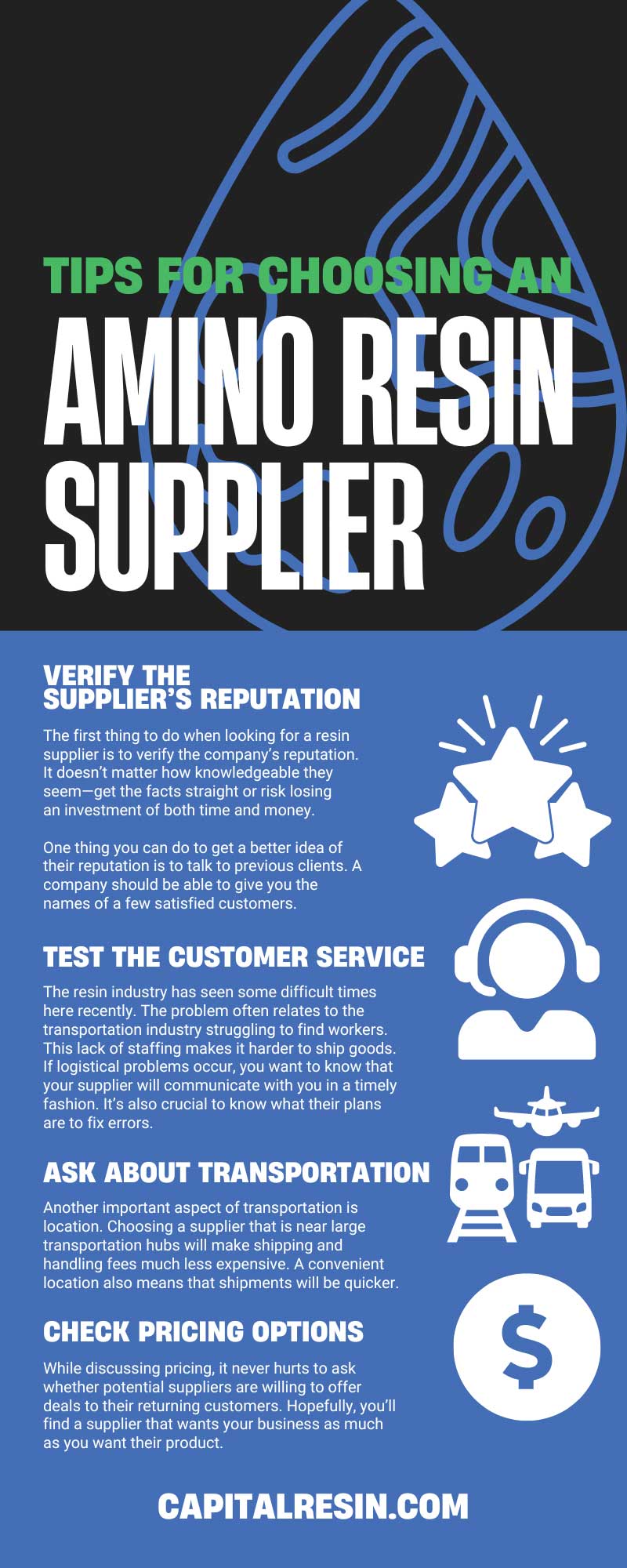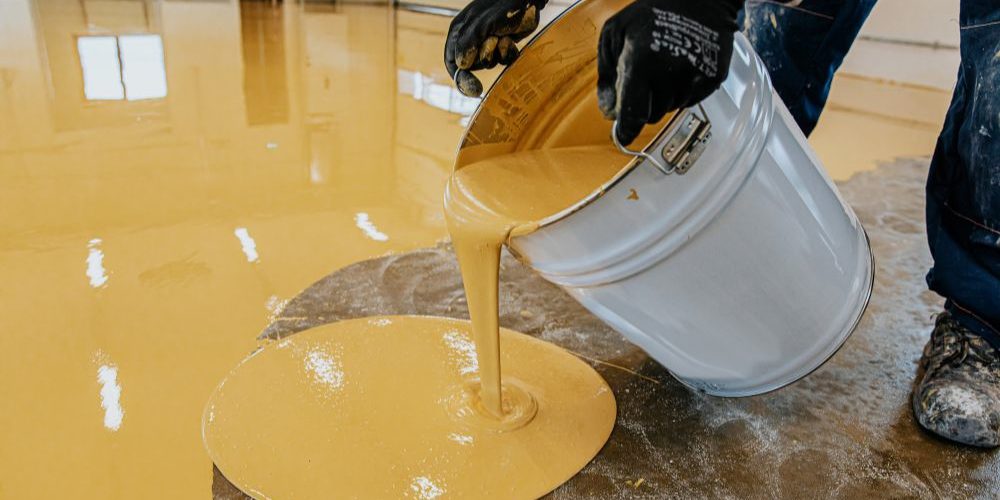Thanks to the transportation difficulties stemming from the COVID-19 pandemic, industrial supply chains across the globe are struggling. Meanwhile, the demand for resin products has only increased, resulting in a considerable gap between demand and available supply. Discover five tips for choosing an amino resin supplier who can work with you to meet the challenge and stock your business quickly.
What Is an Amino Resin?
Before we get to the tips, it helps to have some working knowledge about the chemical structure of resin and amino resins in particular. This knowledge will help you see why finding a good supplier isn’t a straightforward process.
Amino resins are condensation thermosetting polymers comprised of formaldehyde and either urea or melamine. You can think of melamine as a more concentrated form of urea. Let’s break down what some of these traits mean so that you can understand what’s at stake in finding a supplier.
What Is a Polymer?
A polymer is a material made up of long chains of molecules. Polymers are everywhere, and some even occur naturally, like rubber. Polyester, epoxy, and glass are man-made polymers that we use all the time in everyday life. Since polymers have a strong internal construction, they can be quite rigid. Today, we use plasticizers to make polymers more pliable for human needs.
Condensation Reactions
If you think back to your high school science courses, you may recall that there are four basic types of chemical reactions. The first of these, synthesis, is the creation of new substances by combining ingredients. However, synthesis reactions can range from simple to complex. Sometimes there are multiple stages to the reaction, or the process may create a byproduct. In condensation reactions, two molecules combine to form a single molecule, typically resulting with the loss of a small molecule, such as water. Since water is lost, this condensation reaction is as an example of a dehydration synthesis. Condensation reactions can produce byproducts other than water as well, such as ammonia, or forms of alcohol.
Thermosetting Polymers
Unlike other resins, amino resins require heat for their creation. When you add urea to formaldehyde, you wind up with a mixture of monomethylol urea and dimethylol urea. If you heat that mixture when an acid is present, you get condensation (water) and a new polymer (the amino resin). The process is essentially the same when melamine replaces urea, though the derivatives are different.
What Makes Amino Resins Special?
Amino resins have a very high tensile strength. However, they will break if you try to change their shape after molding. Amino resins are very structurally strong, but they can fracture.
Amino resins are also special because they contain a high amount of nitrogen. When they break down, nitrogen releases over time. This trait makes amino resins a vital ingredient in slow-release fertilizers and other agricultural products.
Uses for Amino Resins
Amino resins are an essential part of many industries. People use them in paints, lacquers, packaging, and even furniture. Some of the most common examples of uses include:
- Air filtration
- Food and beverage packaging
- Slow-release fertilizers
- Plasticizers
- Foam
- Industrial coatings
- Particleboard
Choosing the Right Supplier
Now that you understand how amino resins differ from other types of resin, it should be clear why working with a good supplier matters. If you choose the wrong company to partner with, you could end up with substandard goods and services. Here are our tips for choosing an amino resin supplier.
Tip 1: Verify the Supplier’s Reputation
The first thing to do when looking for a resin supplier is to verify the company’s reputation. It doesn’t matter how knowledgeable they seem—get the facts straight or risk losing an investment of both time and money.
One thing you can do to get a better idea of their reputation is to talk to previous clients. A company should be able to give you the names of a few satisfied customers.
Tip 2: Test the Customer Service
The resin industry has seen some difficult times here recently. The problem often relates to the transportation industry struggling to find workers. This lack of staffing makes it harder to ship goods. If logistical problems occur, you want to know that your supplier will communicate with you in a timely fashion. It’s also crucial to know what their plans are to fix errors.
You can investigate some of these customer service response times by calling the company’s support number or sending an email. Keep track of how long it takes to connect with a real person.
Tip 3: Ask About Transportation
Transporting resins is tricky. Many resins tend to taint other goods, which complicates shipping logistics. With thermoset resins, things can become even trickier. If your supplier fails to store resin in temperature-controlled containers, you could end up with a block of set resin.
Another important aspect of transportation is location. Choosing a supplier that is near large transportation hubs will make shipping and handling fees much less expensive. A convenient location also means that shipments will be quicker.
Tip 4: Ask About Custom Resins
Ideally, choosing a resin supplier is something you won’t have to do very often. It helps to know if your supplier has a wide range of goods and services so that you can get everything you need from one place. Even if your current needs are limited in scope, always ask about things you may need in the future. For resin suppliers, you can discuss topics such as the ability to research and design custom products for you.
If you can receive goods and services from the same place, you’ll end up paying less for shipping. You’ll also be able to build a stronger relationship with one company rather than having several partners to manage.
Tip 5: Check Pricing Options
Asking several suppliers for a pricing estimate is a straightforward way to figure out who overcharges. It can also show you who undercharges for their goods and services, which may mean the company lacks confidence in its product.
While discussing pricing, it never hurts to ask whether potential suppliers are willing to offer deals to their returning customers. Hopefully, you’ll find a supplier that wants your business as much as you want their product.
Quality Resins From the Chemical Experts
If you’re looking for a new melamine resin manufacturer, look no further than Capital Resin Corporation. We’ve been in the business for over 45 years, and we know how essential resin is to the modern world. We’re also experts in shipping chemicals safely and efficiently, so you know you’re always getting what you ordered. Call or email us today!








